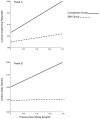Daily stress and cortisol patterns in parents of adult children with a serious mental illness
- PMID: 21895369
- PMCID: PMC3254790
- DOI: 10.1037/a0025325
Daily stress and cortisol patterns in parents of adult children with a serious mental illness
Abstract
Objective: The goal of the current study was to examine whether parenting an adult child with a serious mental illness (SMI) has a physiological impact on parents.
Method: Multiple samples of saliva were collected on 4 days from 61 parents (mean age = 60.07 years, SD = 10.01) of individuals with a SMI (bipolar disorder, schizophrenia, and major depression; mean age = 32.46 years, SD = 10.57) and a comparison group of 321 parents (mean age = 58.09 years, SD = 12.88) of individuals without a SMI (mean age = 32.36; SD = 13.87). Saliva samples were assayed for the hormone cortisol and group differences in diurnal cortisol patterns and their association with daily stress severity were explored.
Results: On days after elevated stress, a hypoactivation pattern of diurnal cortisol suggestive of chronic stress was evident for parents of individuals with a SMI. After more stressful days, cortisol levels increased less from waking to 30 min after waking and declined less from 30 min after waking to bedtime for parents of individuals with a SMI.
Conclusions: The results of the current study add to a growing body of evidence that the long-term effects of parenting an adult with a disability has a biological impact on aging parents and support the need for family interventions across adulthood and into old age for parents of individuals with SMI.
Figures
References
-
- Almeida DM, Wethington E, Kessler RC. The Daily Inventory of Stressful Events: An interview-based approach for measuring daily stressors. Assessment. 2002;9:41–55. - PubMed
-
- Brim OG, Ryff CD, Kessler RC. The MIDUS National Survey: An overview. In: Brim OG, Ryff CD, Kessler RC, editors. How healthy are we?: A national study of well-being at midlife. University of Chicago Press; Chicago, IL: 2004. pp. 1–36.
-
- Dixson WJ, Yuen KK. Trimming and winsorization: A review. Statistical Papers. 1974;15:157–170.


